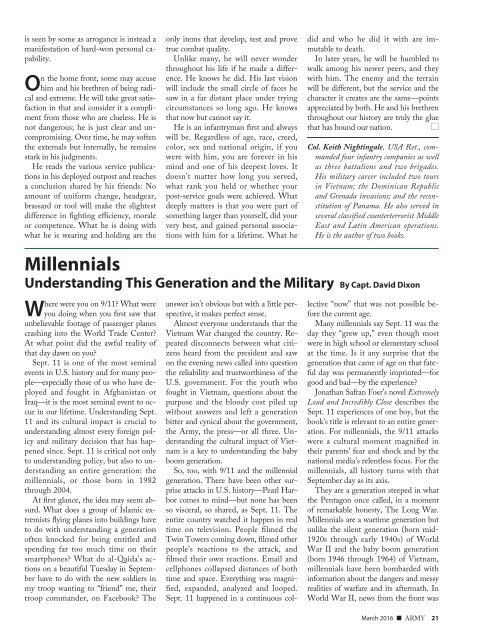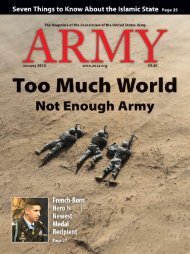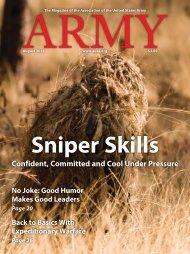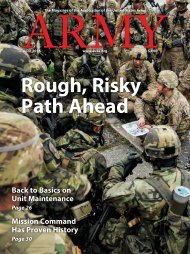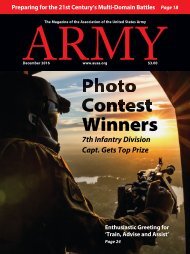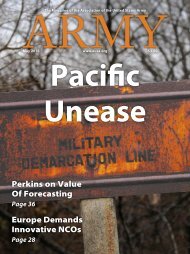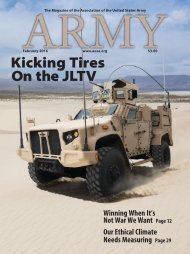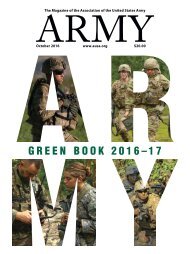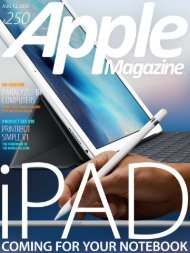Army - Stimulating Simulation
You also want an ePaper? Increase the reach of your titles
YUMPU automatically turns print PDFs into web optimized ePapers that Google loves.
is seen by some as arrogance is instead a<br />
manifestation of hard-won personal capability.<br />
On the home front, some may accuse<br />
him and his brethren of being radical<br />
and extreme. He will take great satisfaction<br />
in that and consider it a compliment<br />
from those who are clueless. He is<br />
not dangerous; he is just clear and uncompromising.<br />
Over time, he may soften<br />
the externals but internally, he remains<br />
stark in his judgments.<br />
He reads the various service publications<br />
in his deployed outpost and reaches<br />
a conclusion shared by his friends: No<br />
amount of uniform change, headgear,<br />
brassard or tool will make the slightest<br />
difference in fighting efficiency, morale<br />
or competence. What he is doing with<br />
what he is wearing and holding are the<br />
only items that develop, test and prove<br />
true combat quality.<br />
Unlike many, he will never wonder<br />
throughout his life if he made a difference.<br />
He knows he did. His last vision<br />
will include the small circle of faces he<br />
saw in a far distant place under trying<br />
circumstances so long ago. He knows<br />
that now but cannot say it.<br />
He is an infantryman first and always<br />
will be. Regardless of age, race, creed,<br />
color, sex and national origin, if you<br />
were with him, you are forever in his<br />
mind and one of his deepest loves. It<br />
doesn’t matter how long you served,<br />
what rank you held or whether your<br />
post-service goals were achieved. What<br />
deeply matters is that you were part of<br />
something larger than yourself, did your<br />
very best, and gained personal associations<br />
with him for a lifetime. What he<br />
did and who he did it with are immutable<br />
to death.<br />
In later years, he will be humbled to<br />
walk among his newer peers, and they<br />
with him. The enemy and the terrain<br />
will be different, but the service and the<br />
character it creates are the same—points<br />
appreciated by both. He and his brethren<br />
throughout our history are truly the glue<br />
that has bound our nation. ■<br />
Col. Keith Nightingale, USA Ret., commanded<br />
four infantry companies as well<br />
as three battalions and two brigades.<br />
His military career included two tours<br />
in Vietnam; the Dominican Republic<br />
and Grenada invasions; and the reconstitution<br />
of Panama. He also served in<br />
several classified counterterrorist Middle<br />
East and Latin American operations.<br />
He is the author of two books.<br />
Millennials<br />
Understanding This Generation and the Military By Capt. David Dixon<br />
Where were you on 9/11? What were<br />
you doing when you first saw that<br />
unbelievable footage of passenger planes<br />
crashing into the World Trade Center?<br />
At what point did the awful reality of<br />
that day dawn on you?<br />
Sept. 11 is one of the most seminal<br />
events in U.S. history and for many people—especially<br />
those of us who have deployed<br />
and fought in Afghanistan or<br />
Iraq—it is the most seminal event to occur<br />
in our lifetime. Understanding Sept.<br />
11 and its cultural impact is crucial to<br />
understanding almost every foreign policy<br />
and military decision that has happened<br />
since. Sept. 11 is critical not only<br />
to understanding policy, but also to understanding<br />
an entire generation: the<br />
millennials, or those born in 1982<br />
through 2004.<br />
At first glance, the idea may seem absurd.<br />
What does a group of Islamic extremists<br />
flying planes into buildings have<br />
to do with understanding a generation<br />
often knocked for being entitled and<br />
spending far too much time on their<br />
smartphones? What do al-Qaida’s actions<br />
on a beautiful Tuesday in September<br />
have to do with the new soldiers in<br />
my troop wanting to “friend” me, their<br />
troop commander, on Facebook? The<br />
answer isn’t obvious but with a little perspective,<br />
it makes perfect sense.<br />
Almost everyone understands that the<br />
Vietnam War changed the country. Repeated<br />
disconnects between what citizens<br />
heard from the president and saw<br />
on the evening news called into question<br />
the reliability and trustworthiness of the<br />
U.S. government. For the youth who<br />
fought in Vietnam, questions about the<br />
purpose and the bloody cost piled up<br />
without answers and left a generation<br />
bitter and cynical about the government,<br />
the <strong>Army</strong>, the press—or all three. Understanding<br />
the cultural impact of Vietnam<br />
is a key to understanding the baby<br />
boom generation.<br />
So, too, with 9/11 and the millennial<br />
generation. There have been other surprise<br />
attacks in U.S. history—Pearl Harbor<br />
comes to mind—but none has been<br />
so visceral, so shared, as Sept. 11. The<br />
entire country watched it happen in real<br />
time on television. People filmed the<br />
Twin Towers coming down, filmed other<br />
people’s reactions to the attack, and<br />
filmed their own reactions. Email and<br />
cellphones collapsed distances of both<br />
time and space. Everything was magnified,<br />
expanded, analyzed and looped.<br />
Sept. 11 happened in a continuous collective<br />
“now” that was not possible before<br />
the current age.<br />
Many millennials say Sept. 11 was the<br />
day they “grew up,” even though most<br />
were in high school or elementary school<br />
at the time. Is it any surprise that the<br />
generation that came of age on that fateful<br />
day was permanently imprinted—for<br />
good and bad—by the experience?<br />
Jonathan Safran Foer’s novel Extremely<br />
Loud and Incredibly Close describes the<br />
Sept. 11 experiences of one boy, but the<br />
book’s title is relevant to an entire generation.<br />
For millennials, the 9/11 attacks<br />
were a cultural moment magnified in<br />
their parents’ fear and shock and by the<br />
national media’s relentless focus. For the<br />
millennials, all history turns with that<br />
September day as its axis.<br />
They are a generation steeped in what<br />
the Pentagon once called, in a moment<br />
of remarkable honesty, The Long War.<br />
Millennials are a wartime generation but<br />
unlike the silent generation (born mid-<br />
1920s through early 1940s) of World<br />
War II and the baby boom generation<br />
(born 1946 through 1964) of Vietnam,<br />
millennials have been bombarded with<br />
information about the dangers and messy<br />
realities of warfare and its aftermath. In<br />
World War II, news from the front was<br />
March 2016 ■ ARMY 21


